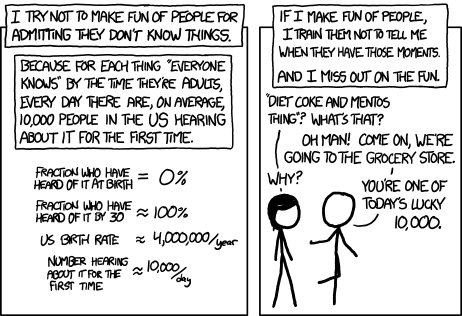Dodam asked me what ideas I thought were most essential. Here are my first thoughts.
Idea: Programming literacy
Material: COS 126 (for example)
Why?
Understanding the ways in which ideas can be combined is essential for creativity and problem solving. Not being able to see how software can make things possible is a significant setback for this. (Has positives too: constraints beget creativity. This constraint isn’t worth it though!)
The vast majority of people I interact with have this skillset. So it can be momentarily jarring when it’s absent (if it becomes relevant).
Idea: Understanding other people’s limitations
Material: https://xkcd.com/1053/

Why?
Finding out that someone doesn’t know something you expect them to know can be jarring, but being condescending or judgemental in response doesn’t help anyone. It’s okay to let the person know you’re surprised by their lack of knowledge, but best to refrain from adding any negative valence to this surprisal.
There are essentially no benefits to disrespecting or being incredulous about someone’s limitations in knowledge/skill/memory/etc.
Everyone learns faster, and everyone finds the world more interesting when these limitations are acknowledged in a supportive way.
Plus it’s respectful.
People‘s experiences are varied. Our memories are limited. Our values are different. Let’s help each other to learn and remember, even the most “obvious” of things.
Idea: Super-communication
Material: Khan Academy blog post from Ben Kamens https://bjk5.com/post/71887196490/email-transparency-at-khan-academy#_=_
Why?
The people at Khan Academy are incredibly productive (c. 2013). Collectively this group is super talented, driven, and least expectedly: super-communicative.
The blog post linked above gives a small taste of how.
My main takeaway from that summer is the value of “super communication”.
Make every thought, action, idea public to the people it might affect.
To be clear: They don’t need a notification about every thought; they might never read 90% of them.
This has a number of positive effects:
- Confidence
Let’s say you’re thinking of performing some action, e.g. moving a stack of bricks to where they’ll be used. You think it’s the right thing to do, but you’re not 100% sure. Do you ask someone? Do you do it anyway?
Under super-communication you don’t ask permission, you instead announce your intent to move the bricks. Then wait a moment before starting to move them to give people a chance to see your message.
Since all stakeholders have access to this announcement, you can start doing the things you think is right: moving the bricks.
Someone would let you know if they think you shouldn’t be doing it.
So through super communication you can take more ownership over construction without worrying about stepping on people’s toes or messing up bigger plans. (To clarify, this strategy requires the broadcasted message to have some visibility, e.g. a low-priority chat room; this doesn’t work if no one is going to see the message.)
- Thinking things through
Super communication is hard work. It’s time consuming to share every thought. But a benefit of this is it makes you concretize your thoughts. Sharing them forces you to put them into words that others can understand. In doing so you naturally think through what others would think of your idea, and so your idea develops and improves.
You also make yourself open to receiving feedback and thoughts on your idea, which can improve the idea and lead to new ones.
- Trust and transparency
Putting your ideas out in the open gives people a better sense of where you’re coming from, and what your intentions are. It builds trust, and prevents misunderstandings about who is doing what and when.
- No surprises
You’ll avoid having situations where person A thought person B was working on X is person B has actively been communicating that they’re working on Y.
Super communication is hard work. I fall out of the habit quickly. But every time I’m reminded of its value and my experience at Khan Academy I’m reinforced in my belief that is worth striving for, and at least for a short time I’m better for it.
Idea: Communication bubbles/bonding and bridging
Material: Maybe start with https://ncase.me/crowds/
tl;dr: “A healthy society needs a sweet spot of bonds within groups and bridges between groups.”
Nicky Case links to more substantive material if you want to dive deeper. The idea itself is simple though; it’s being actively conscious of it that’s important and which can be challenging.
Idea: Castles in the clouds as belief systems
The core idea is that all beliefs have provenance, but the provenance can be lost while the beliefs remain.
I don’t have a good source for this one, but I think it’s essential.
Ironic, eh?
I’ll elaborate more on this idea later.